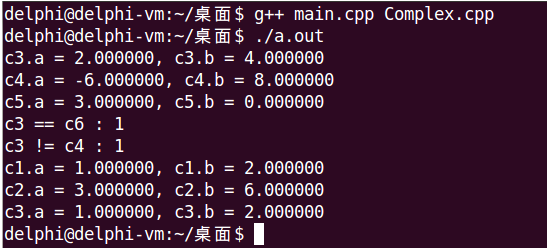目录
1. 操作符重载的概念
操作符重载的本质
操作符重载的本质是用特殊形式的函数扩展操作符的功能
- C++通过
operator关键字定义操作符重载函数 - 操作符重载遵循相同的函数重载规则
操作符重载的规则
在进行操作符重载时,必须遵循以下三条规则
- 不能改变原操作符的优先级
- 不能改变操作数的个数
- 不能改变操作符的原有语义
操作符重载的实现
全局函数和成员函数都可以实现对操作符的重载,重载为全局函数的语法规则为
/*
* Sign为预定义的操作符,如:+, -, *, /;
* lp和rp分别为左操作数和右操作数.
*/
Type operator Sign (const Type &lp, const Type &rp)
{
}
如果重载为全局函数,则需要在友元的辅助下才能实现,因此,一般选择将操作符重载为类的成员函数
class Type
{
public:
Type operator Sign (const Type &rp)
{
}
};
- 比起全局操作符重载函数少一个参数(左操作数)
- 不需要依赖友元就可以完成操作符重载
- 编译器优先在成员函数中寻找操作符重载函数
#include <stdio.h>
class Complex
{
int a;
int b;
public:
Complex(int a = 0, int b = 0)
{
this->a = a;
this->b = b;
}
int getA()
{
return a;
}
int getB()
{
return b;
}
Complex operator + (const Complex &p)
{
Complex ret;
printf("Complex operator + (const Complex& p)
");
ret.a = this->a + p.a;
ret.b = this->b + p.b;
return ret;
}
friend Complex operator + (const Complex &p1, const Complex &p2);
};
Complex operator + (const Complex &p1, const Complex &p2)
{
Complex ret;
printf("Complex operator + (const Complex& p1, const Complex& p2)
");
ret.a = p1.a + p2.a;
ret.b = p1.b + p2.b;
return ret;
}
int main()
{
Complex c1(1, 2);
Complex c2(3, 4);
Complex c3 = c1 + c2; // c1.operator + (c2)
printf("c3.a = %d, c3.b = %d
", c3.getA(), c3.getB());
return 0;
}

2. 复数类的实现
下面,我们通过一个复数类,来分别实现算术运算操作符、比较操作符和赋值操作符的重载,以下是头文件和源文件的非重载部分代码。
Complex.h
#ifndef _COMPLEX_H_
#define _COMPLEX_H_
class Complex
{
double a;
double b;
public:
Complex(double a = 0, double b = 0);
double getA();
double getB();
double getModulus();
Complex operator + (const Complex &c);
Complex operator - (const Complex &c);
Complex operator * (const Complex &c);
Complex operator / (const Complex &c);
bool operator == (const Complex &c);
bool operator != (const Complex &c);
Complex &operator = (const Complex &c);
};
#endif
Complex.cpp
#include "Complex.h"
#include <cmath>
Complex::Complex(double a, double b)
{
this->a = a;
this->b = b;
}
double Complex::getA()
{
return a;
}
double Complex::getB()
{
return b;
}
double Complex::getModulus()
{
return sqrt(a * a + b * b);
}
运算操作符重载
Complex.cpp
Complex Complex::operator + (const Complex &c)
{
Complex ret;
ret.a = a + c.a;
ret.b = b + c.b;
return ret;
}
Complex Complex::operator - (const Complex &c)
{
Complex ret;
ret.a = a - c.a;
ret.b = b - c.b;
return ret;
}
Complex Complex::operator * (const Complex &c)
{
Complex ret;
ret.a = a * c.a - b * c.b;
ret.b = a * c.b + b * c.a;
return ret;
}
Complex Complex::operator / (const Complex &c)
{
Complex ret;
double cm = c.a * c.a + c.b * c.b;
ret.a = (a * c.a + b * c.b) / cm;
ret.b = (b * c.a - a * c.b) / cm;
return ret;
}
比较操作符重载
Complex.cpp
bool Complex::operator == (const Complex &c)
{
return (a == c.a) && (b == c.b);
}
bool Complex::operator != (const Complex &c)
{
return !(*this == c);
}
赋值操作符重载
Complex.cpp
Complex &Complex::operator = (const Complex &c)
{
if (this != &c)
{
a = c.a;
b = c.b;
}
return *this;
}
注意,赋值操作符有几点特殊之处:
- C++规定赋值操作符只能重载为成员函数
- 赋值操作符重载函数返回类型为引用,目的是为了实现连等,如
a = b = c
复数类测试
main.cpp
#include "Complex.h"
#include <cstdio>
int main()
{
Complex c1(1, 2);
Complex c2(3, 6);
Complex c3 = c2 - c1;
Complex c4 = c1 * c3;
Complex c5 = c2 / c1;
printf("c3.a = %f, c3.b = %f
", c3.getA(), c3.getB());
printf("c4.a = %f, c4.b = %f
", c4.getA(), c4.getB());
printf("c5.a = %f, c5.b = %f
", c5.getA(), c5.getB());
Complex c6(2, 4);
printf("c3 == c6 : %d
", c3 == c6);
printf("c3 != c4 : %d
", c3 != c4);
(c3 = c2) = c1;
printf("c1.a = %f, c1.b = %f
", c1.getA(), c1.getB());
printf("c2.a = %f, c2.b = %f
", c2.getA(), c2.getB());
printf("c3.a = %f, c3.b = %f
", c3.getA(), c3.getB());
return 0;
}

3. 赋值操作符重载和拷贝构造函数
赋值操作符重载与深拷贝
赋值操作符重载和拷贝构造函数具有相同的作用和意义,那么,C++什么时候调用赋值操作符重载函数?什么时候调用拷贝构造函数?
ClassName c1;
ClassName c2 = c1; //调用拷贝构造函数
ClassName c3(c1); //调用拷贝构造函数
ClassName c4;
c4 = c1; //调用赋值操作符重载函数
和拷贝构造函数类似
- 编译器为每个类默认重载了赋值操作符
- 默认的赋值操作符重载函数仅完成浅拷贝
- 当需要进行深拷贝时,必须重载赋值操作符
作为一般性原则,重载赋值操作符,必然需要实现深拷贝!!!
#include <iostream>
#include <string>
using namespace std;
class Test
{
int *m_pointer;
public:
Test()
{
m_pointer = NULL;
}
Test(int i)
{
m_pointer = new int(i);
}
/*拷贝构造函数实现深拷贝*/
Test(const Test &obj)
{
m_pointer = new int(*obj.m_pointer);
}
/*重载赋值操作符实现深拷贝*/
Test &operator = (const Test &obj)
{
if (this != &obj)
{
delete m_pointer;
m_pointer = new int(*obj.m_pointer);
}
return *this;
}
void print()
{
cout << "m_pointer = " << hex << m_pointer << endl;
}
~Test()
{
delete m_pointer;
}
};
int main()
{
Test t1 = 1;
Test t2;
t2 = t1;
t1.print();
t2.print();
return 0;
}

数组类IntArray改进
IntArray.h
#ifndef _INTARRAY_H_
#define _INTARRAY_H_
class IntArray
{
public:
IntArray &operator = (const IntArray &obj); //Add
};
#endif
IntArray.cpp
IntArray &IntArray::operator = (const IntArray &obj)
{
if (this != &obj)
{
int *pointer = new int[obj.m_length];
if (pointer != NULL)
{
for (int i = 0; i < obj.m_length; i++)
{
pointer[i] = obj.m_pointer[i];
}
m_length = obj.m_length;
delete m_pointer;
m_pointer = pointer;
}
}
return *this;
}